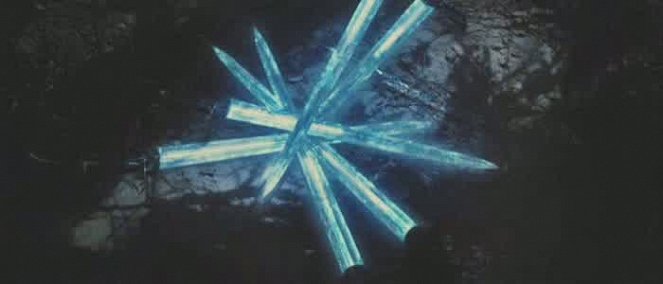Le Monde de Narnia : L'odyssée du passeur d'aurore
-
The Chronicles of Narnia: Voyage of the Dawn Treader (plus)
Réalisation:
Michael AptedPhotographie:
Dante SpinottiMusique:
David ArnoldActeurs·trices:
Ben Barnes, Skandar Keynes, Georgie Henley, Will Poulter, Liam Neeson, Gary Sweet, Bruce Spence, William Moseley, Anna Popplewell, Tilda Swinton (plus)VOD (4)
Résumés(1)
Happés à l’intérieur d’un intriguant tableau, Edmund et Lucy Pevensie, ainsi que leur détestable cousin Eustache, se retrouvent subitement projetés dans le royaume de Narnia, à bord d’un navire majestueux: le Passeur d’Aurore. Rejoignant Caspian, devenu roi, et l’intrépide souris guerrière Ripitchip, ils embarquent pour une périlleuse mission dont dépend le sort même de Narnia. A la recherche de sept seigneurs disparus, nos voyageurs entament un envoûtant périple vers les îles mystérieuses de l’Est, où ils ne manqueront pas de rencontrer tant de créatures magiques que de merveilles inimaginables. Mais ils devront surtout vaincre leurs peurs les plus profondes en affrontant de sinistres ennemis, tout en résistant à de terribles tentations auxquelles ils seront confrontés. Il est temps pour eux de faire preuve d’un courage légendaire au cours d’une odyssée qui les transformera à jamais et les emportera au bout du monde, où le grand Lion Aslan les attend. (20th Century Fox FR)
(plus)Critiques (2)
I have to admit that I really missed Andrew Adamson as co-writer and director. The screenwriting team brought in Michael Petroni and Michael Apted was brought in to direct, creating the inevitable subtle divide between the first two films and Voyage of the Dawn Treader. A certain compactness was broken, but fortunately, the essential line of nuance that distinguished the films from the original books remained intact (Adamson stayed on as producer). Everything that could have definitively broken the spell of Narnia was handled elegantly in Prince Caspian, namely the excessive production time between the individual films. The Pevensies, including Eustace, found themselves successively in Narnia between 1940 and 1942, and while we have yet to see Eustace's return, five years have already passed. It was necessary thus to strengthen the themes of growing up gradually for all the main characters, whereas, in a faster production, it would not have been strictly necessary. Unlike previous adaptations (and the book), new connections were made between the films that I really enjoy. For the first time, there was a positive reflection on Susan's summer in America, which is wonderful and revolutionary. In all of the works, the realistic wartime basis is maintained, which is great because one of the most essential interpretations of the "Chronicles of Narnia" speaks of the frustration that went into interpreting the lived adventures as a reclaimed childhood. However, given the nature of the adventurous voyage of the Dawn Treader, I tend to believe there was new frustration on the script front. Something that is added, namely the spreading introduction in Cambridge, although entirely appropriate, seems to force all the stops on the various islands to be heavily relativized and sped up. The adventure rolls on and on at a dangerous pace and there are at least two storylines that deserve to receive more importance. Missing is any mention of Caspian's marriage to Ramandu's daughter Lilliandil (with no mention of Caspian and Susan's newly added romance in the last volume), and completely devoid of any significant conceptual meaning is the story of Gael and her father's pilgrimage to find her missing mother. It might have been different if the slave system in the Lone Islands had been dealt with more widely, and if there had been a development of relations with the locals. In this way, we can only fully enjoy especially the naturally dominating Reepicheep and Eustace, who in many ways overshadowed the main group. After all, Lucy and Ed in particular have changed a lot under the new director. In Adamson's case, some scenes, such as the Christmas presents or Jadis, would probably have been more expressive. Adamson also had a happier choice for the song for the closing credits - "The Call," with its absolutely perfect lyrics, remained unsurpassed. But now I'm curious about the peripeteia of "The Silver Chair…"
()
The book series "The Chronicles of Narnia" was predicted to become the new "Lord of the Rings". Films based on this septalogy began to be made, with similar success expected as with the trilogy based on J.R.R. Tolkien's work. However, the success did not come, at least not to the extent that there were long queues for the movies. The third film has already been made - the one I am reviewing - and there are talks of a fourth and fifth film. Let them be successful. "The Chronicles of Narnia" tries to be epic, wanting to present us with a beautiful world, fairy-tale-like and wonderful, but there may be too many biblical references in the film. Why burden the mind of a child, for whom the stories are obviously made? And why annoy the adults, who have to constantly imagine Aslan as some kind of Messiah? The first installment was quite good - at least as a fairy tale. In the third installment, some "favorite" characters return, but for me personally, it was quite boring, and I must say that I prefer more intense fantasy than this gentle children's adaptation. Perhaps it is an attempt to be faithful to the source material, but I wouldn't be afraid to toughen it up a bit. It would appeal more to adults. Why not? It worked for Harry Potter. More information: http://www.filmovy-denik.cz/2012/06/karate-kid-parchanti-hromy-blesky-uca.html
()

